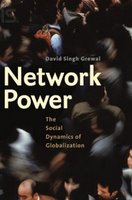
Sigh. Another book to add to the ‘must read’ pile — David Singh Grewal’s Network Power: The Social Dynamics of Globalization. Here’s the abstract:
David Singh Grewal’s remarkable and ambitious book draws on several centuries of political and social thought to show how globalization is best understood in terms of a power inherent in social relations, which he calls network power. Using this framework, he demonstrates how our standards of social coordination both gain in value the more they are used and undermine the viability of alternative forms of cooperation. A wide range of examples are discussed, from the spread of English and the gold standard to the success of Microsoft and the operation of the World Trade Organization, to illustrate how global standards arise and falter. The idea of network power supplies a coherent set of terms and concepts—applicable to individuals, businesses, and countries alike—through which we can describe the processes of globalization as both free and forced. The result is a sophisticated and novel account of how globalization, and politics, work.
So after Hard Power, and Joe Nye’s Soft Power, students of International Relations will have to come to terms with Network Power. About time too.
Christopher Caldwell wrote a thoughtful piece about the book in yesterday’s FT. Excerpt:
At the heart of globalisation is a basic, and politically explosive, mystery; globalisation proceeds through the breaking down of boundaries, the unfolding of diversity and freedom of choice – so why is it experienced by so many people as a constriction, an oppression and a loss of freedom? In a brilliant and subtle book*, a Harvard graduate student has solved this mystery – even if he has not solved the problem. David Singh Grewal believes the answer lies in something called “network power”. Networks are the means by which globalisation proceeds. All networks have standards embedded in them. In theory we can choose among the standards and become more free. In practice, Mr Grewal shows, our choices tend to narrow over time, so that standards are imposed on us.
Here is how it works. Networks tend to grow. As time passes, one of the most attractive things about a network will be simply that a large number of people have already chosen it. This is network power. Once a network reaches “critical mass”, Mr Grewal says, the incentives to join it can become irresistible. Certainly some standards are intrinsically better than others. “But as the network power of a standard grows,” Mr Grewal writes, “the intrinsic reasons why it should be adopted become less important relative to the extrinsic benefits of co-ordination that the standard can provide.” People defect from alternative networks. Eventually those alternatives disappear altogether. The choice of networks becomes a Hobson’s choice. You remain free to choose your network, but the distinction between choosing to join a network and being forced to join one is less evident.
Mr Grewal sees such a “merger of reason and force” in many areas, economic and non-economic – from the Windows operating system to the ISO 9000 standard of industrial control to Britain’s adoption of the metric system. Since English has become the first global lingua franca, many non-native speakers have freely chosen to speak it. But, for someone who wants to participate in the global economy – which is to say, the economy – to what extent is this really a choice?
Networks, Mr Grewal believes, can impinge on our political autonomy, channelling it into situations where dissent is possible but pointless. Although people enter them freely, networks, like political systems, can bias outcomes. A new order can be camouflaged as a broadening of options. Networks vary along three dimensions, Mr Grewal thinks: “compatibility” (with other networks); “availability” (openness); and “malleability”. They tend to be open and compatible in the early stages, and open and incompatible in the later ones.
Hmm… Just tried to order it from Amazon.co.uk, but they’re claiming the book hasn’t been published yet in the UK.
